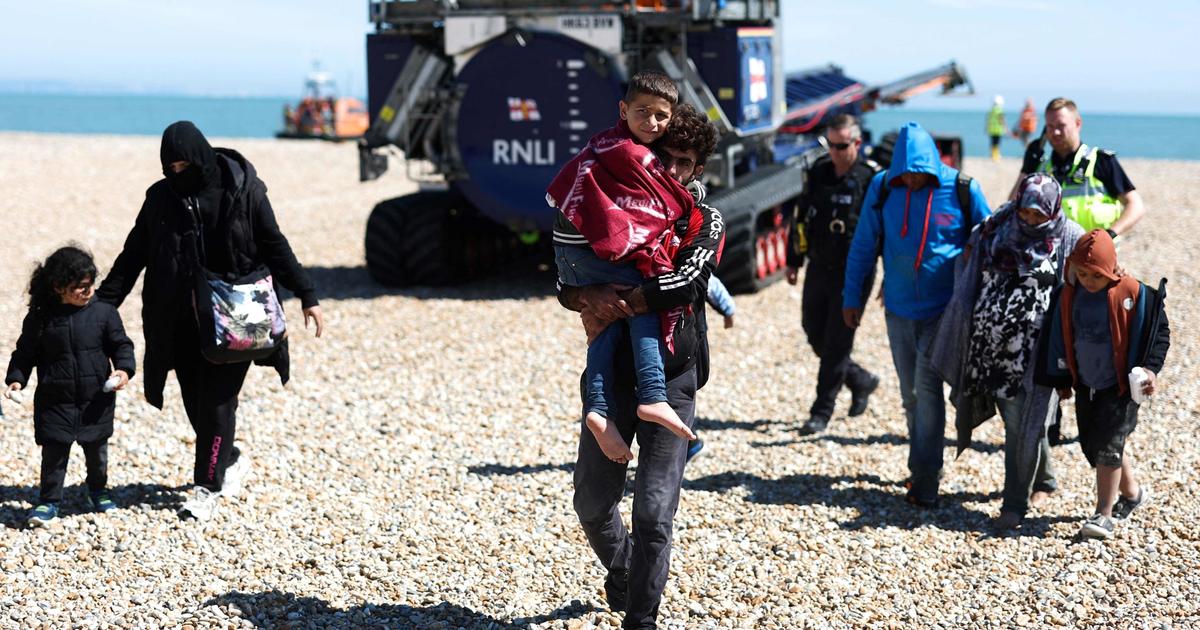The ever more deadly Channel crossings revived Franco-British tensions.
Three migrants again lost their lives at sea off Calais, trying to reach England on Thursday from northern France.
Disappearances which add to an already alarming human toll and for which the two countries, blame each other.
Above all, the migration crisis is added to a series of tensions that continue to tarnish relations between the two powers, since Brexit.
Explanations.
What does the UK blame France for?
Since January, the authorities have deplored three dead and four missing in Channel crossings.
A record that is in line with the sad continuity of previous years, with six deaths in 2020, four in 2019. A fatality to which the United Kingdom refuses, hastening to pass the blame on its neighbor across the Channel.
The number of migrants "that we have seen leaving France" is "unacceptable", reacted a spokesperson for the British Home Office.
“The British public is tired of watching people die while ruthless criminal groups take advantage of their misery,” he added.
To read also "This is my last chance": in Calais, the desperate attempts of migrants to cross the Channel before winter
So many criticisms that do not pass from Paris.
"It is unacceptable to be accused of instrumentalizing migrants and supporting the activities of criminal groups, while our forces are mobilized daily to save lives," said the Ministry of the Interior, adding that "the instrumentalization of this subject for domestic political purposes is not up to the challenge ”.
What observation?
The arrival of winter does not slow down attempts at crossings.
As of Thursday, 1,185 migrants managed to reach the English coast by boat.
A new record, bringing the tally to more than 22,000 since the start of the year.
These ever-increasing attempts are not surprising, however, notes Ekrame Boubtane economist, specialist in issues related to international migration.
“We are facing a record number of internally displaced people in the world: more than 82 million, according to the United Nations. These displacements follow conflicts and more generally a deterioration of the security situation in several countries such as Iraq and Afghanistan. These people then try by all means to reach a developed country, ”notes the lecturer at Clermont Auvergne University.
In addition, the application of Brexit has resulted in a "lack of a regular way to seek asylum," adds the economist.
Because since its divorce from the EU, the United Kingdom has left the so-called “Dublin” regulation, the pillar of the European asylum system.
Concretely, this regulation makes it possible to set up transfers of asylum seekers to other European countries, mostly based on the first country through which the person entered the European Union.
No deal has so far replaced the Dublin Regulation for the UK, but a controversial bill is on the table.
What policy in the UK?
The increase in the number of sea crossings is pushing the United Kingdom to toughen its migration policy. Supported by Interior Minister Priti Patel as "fair but firm", the bill aims to discourage illegal immigration and plans to treat asylum seekers differently depending on whether they have arrived in the country legally or illegally. .
Migrants who seek to enter the territory illegally will face a four-year prison sentence - compared to six months currently. The smugglers will risk life in prison - compared to the current 14 years in prison. This controversial bill, still in the process of adoption, "will repair the broken system which encourages migrants to make this deadly journey", defends the British Home Office. The country also intends to pay 62.7 million euros promised to France to finance border control.
A security policy that will not be sufficient on its own, slice Ekrame Boubtane. “The United Kingdom has chosen to put the package on border surveillance, but the attempts at crossings will not stop for all that. The security policy will not be enough if we do not open other regular migration routes for these people who want national protection, ”said the economist.
By the way, the academic recalls that despite fierce communication on the subject, the British state would have received only 4% of asylum requests sent to Europe, between 2015 and 2019. “The United Kingdom, well second largest European power, has so far played very little part in the reception of refugees: the state recorded an average of 40,000 asylum requests per year between 2015 and 2019, against 110,000 for the France, 360,000 for Germany or 88,000 for Italy, ”reports the specialist.
What context?
It's hard not to finally see behind this umpteenth increase in tension, a British desire to assert itself politically outside the EU. "Prime Minister Boris Johnson reuses with the migration issue, his dear themes developed during Brexit: national sovereignty, the government that does not bow to the EU ...", judge Thibaud Harrois lecturer at the Sorbonne, specialist in British politics.
Above all, the migration crisis is part of a series of recent tensions with France in the aftermath of Brexit (preaching licenses, French submarines, etc.).
So many subjects allowing Boris Johnson to flatter his conservative electorate, while forgetting his possible casseroles, recalls the academic.
“Boris Johnson is facing a corruption scandal.
So when a government finds itself in trouble, shifting attention to other issues remains a tempting option… ”.









